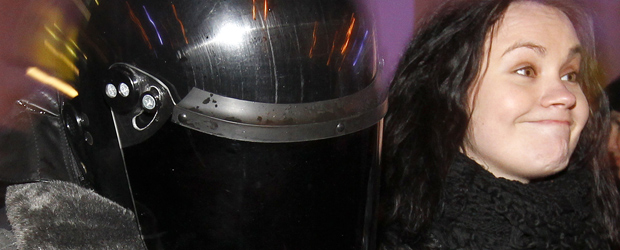Moscow protests over ‘rigged’ Russian elections
Russians take to the streets of Moscow for a second day of protest against the rule of Prime Minister Vladimir Putin, following elections at the weekend.

Opposition leaders, supporters of Mr Putin and riot police confronted each other in the centre of Moscow as protests grow over the outcome of the country’s parliamentary elections at the weekend.
About 500 protesters chanted “Russia without Putin!” and “Freedom!”, but hundreds more turned up at the demonstration to try and drown out the opposition chants with their own loyalist cries of “Russia, Putin!”
The crowd was held back by riot police, with around 100 people detained after scuffles broke out. Boris Nemstov, a liberal opposition leader, told Reuters he was one of those who had been detained. He said he was being held at a police station.
There will be no Slavic spring here in Russia if I have anything to do with it. Maxim Mishenko, on the streets of Moscow
The protests follow a gathering of an estimated 5,000 people on Monday, when crowds assembled to express their opposition to alleged vote-rigging in the election and demand an end to Mr Putin’s rule. Almost 300 people were detained after Monday’s protest, thought to be the biggest opposition protest in the capital for years.
Following Sunday’s parliamentary poll, in which Mr Putin’s United Russia party lost ground to its rivals, the prime minister pledged to reshuffle the government after March’s presidential election – which Mr Putin plans to contest.
Dmitri Peskov, a spokesman for Mr Putin, said sanctioned rallies could continue, but added: “The actions of those who hold unsanctioned demonstrations must be stopped in the appropriate way.”
Read more: Putin's party wins parliamentary elections but dealt huge blow
Pressure on Putin
The protests are the latest sign of pressure on the prime minister, ahead of his attempt to become president again next year and following the poor election results.
The events all point to a mood shift after years of political domination from Mr Putin, a former KGB spy who has built up an image of a tough leader partly through crushing a separatist rebellion in the Chechnya region but also by marginalising opposition and squashing dissent.
His ratings, although still high, have fallen this year and he was booed at a sports event last month.
“We want fair elections. Look at what they have done to our country, our Russia,” said a man who gave his name only as Alexei as he was detained by riot police.
“We pay your wages,” he screamed as they threw him into a bus.
But not all feel the same as Alexei, and many suggest that the likelihood of the Arab Spring moving to Russia is unlikely.
Maxim Mishenko, 34, said he did not want Russia to follow the same path as Libya and Syria into violence.
“I don’t want the same thing to happen here as in Libya or Syria. There will be no Slavic spring here in Russia if I have anything to do with it,” he said.